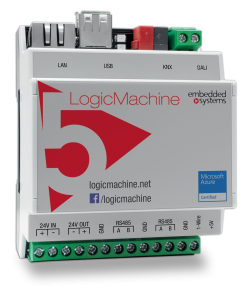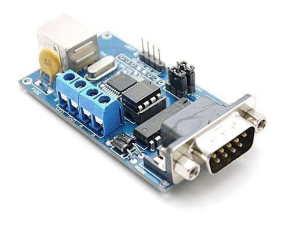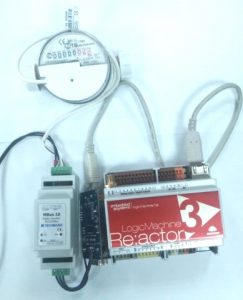M-Bus integration in LM
Example: M-Bus (Meter Bus) integration in LogicMachine platform
Task
Use LogicMachine with external Serial-MBus gateway to gather M-Bus meter readings. Later this data can be transmitted into KNX, BACnet, ModBus and other protocols; or can be used for visualization / trend purpose; or can be used for external cloud solutions.
Devices needed
We used the following components for M-Bus integration into LogicMachine:
-
- LogicMachine with USB or RS-232 port

-
- In case LogicMachine doesn’t have RS-232, you need to use additional USB to RS-232 adapter – USB to RS232 RS485 UART TTL Signal Converter DZ-074

-
- Tecbase Mbus 10 RS232-MBus gateway

-
- Maddalena 1.ETRMD.0340 M-bus water meter

Packages
Starting from firmware 2016.09 MBus packages are included in the firmware.
Library documentation
https://openrb.com/docs/mbus.htm
Examples
Note! As with any scripts which are using serial ports, make sure that only one script is running at any moment of time.
1. Scan the bus
If all short addresses are already programmed, you can scan the bus to find all connected meters. Scan function will return Lua table where key is meter’s short address and value is the scan result. True means that the meter is working correctly, false means that probably several meters share the same short address which caused a collision during scan.
- -- load mbus library
- require('mbus')
- -- use /dev/ttyUSB0 serial port with 2400 baud rate
- mbus.init('/dev/ttyUSB0', 2400)
- -- scan from range 0 to 5 (inclusive)
- res = mbus.scan(0, 5)
- -- save result to Logs tab
- log(res)
2. Change short address of a meter
For small installations you can connect meters one by one and change short addresses for each meter via an event script mapped to a 1-byte unsigned object. Object value is the new short address to set. Script assumes that all new meters have a default short address of 0.
- -- load mbus library
- require('mbus')
- -- use /dev/ttyUSB0 serial port with 2400 baud rate
- mbus.init('/dev/ttyUSB0', 2400)
- -- new address to write
- addr = event.getvalue()
- -- change short address from default 0 to new one
- res, err = mbus.writeaddr(0, addr)
-
- -- change ok
- if res then
- alert('[mbus] changed short address to' .. addr)
- -- change failed
- else
- alert('[mbus] failed to change short address to ' .. addr .. ' ' .. tostring(err))
- end
3. Reading meter data
You can read all single meter data via an event script mapped to a 1-byte unsigned object. Object value is the short address to read, make sure to wait before previous read completes or you will get collision errors.
- -- load mbus library
- require('mbus')
- -- use /dev/ttyUSB0 serial port with 2400 baud rate
- mbus.init('/dev/ttyUSB0', 2400)
- -- new address to write
- addr = event.getvalue()
- -- read all data
- res, err = mbus.getdata(addr)
-
- -- read ok
- if res then
- log(res)
- -- read failed
- else
- alert('[mbus] failed to read data from short address ' .. addr .. ' ' .. tostring(err))
- end
The return value will look similar to this:
- * table:
- [data]
- * table:
- [0]
- * table:
- [timestamp]
- * string: 1470292199
- [unit]
- * string: Fabrication number
- [dif]
- * string: 14
- [value]
- * string: 0
- [vif]
- * string: 120
- [function]
- * string: Instantaneous value
- [storagenumber]
- * string: 0
- [1]
- * table:
- [timestamp]
- * string: 1470292199
- [unit]
- * string: Time Point (time & date)
- [dif]
- * string: 4
- [value]
- * string: 2016-08-04T07:27:00
- [vif]
- * string: 109
- [function]
- * string: Instantaneous value
- [storagenumber]
- * string: 0
- [2]
- * table:
- [timestamp]
- * string: 1470292199
- [unit]
- * string: Volume (m m^3)
- [dif]
- * string: 4
- [value]
- * string: 27
- [vif]
- * string: 19
- [function]
- * string: Instantaneous value
- [storagenumber]
- * string: 0
- ...
For this meter, current value resides at id 2, but it will be different for different meter models.
4. Gathering data from multiple meters
You can use this resident script to read values from meters and update object values as soon as meter value changes. Object datatype should be set to 4-byte unsigned integer when divisor is not set, otherwise it should be set to 4-byte floating point. Refer to the previous example on how to find the id value at which the current value resides.
- -- config init
- if not meters then
- require('mbus')
-
- -- time to wait between each meter read
- sleeptime = 10
- -- use /dev/ttyUSB0 serial port with 2400 baud rate
- mbus.init('/dev/ttyUSB0', 2400)
- -- base address for meter values, meter short address will be added to form the meters group address
- base = '2/1/'
-
- -- meter definition
- -- addr - short address
- -- id - number from data table where value resides
- -- div - optional divisor for convertion to the final value
- meters = {
- { addr = 1, id = 2, div = 1000 }, -- hot water meter, convert from m3 to liters
- { addr = 2, id = 2, div = 1000 }, -- cold water meter, convert from m3 to liters
- { addr = 3, id = 5 }, -- heating meter 1
- { addr = 4, id = 5 }, -- heating meter 2
- }
-
- -- reset meter values on first run
- for _, meter in ipairs(meters) do
- meter.value = 0
- end
- end
-
- -- read each meter
- for _, meter in ipairs(meters) do
- res = mbus.getdata(meter.addr)
-
- -- read ok
- if type(res) == 'table' then
- data = res.data[ meter.id ]
- value = nil
-
- -- get current value
- if type(data) == 'table' then
- value = tonumber(data.value)
- end
-
- -- value is valid and different from previous read
- if value and meter.value ~= value then
- -- apply divisor if set
- div = meter.div
- dpt = div and dt.float32 or dt.uint32
- if div then
- value = value / div
- end
-
- -- update group address value
- grp.update(base .. tostring(meter.addr), value, dpt)
- meter.value = value
- end
- end
-
- -- wait for next read
- os.sleep(sleeptime)
- end
Whole setup



